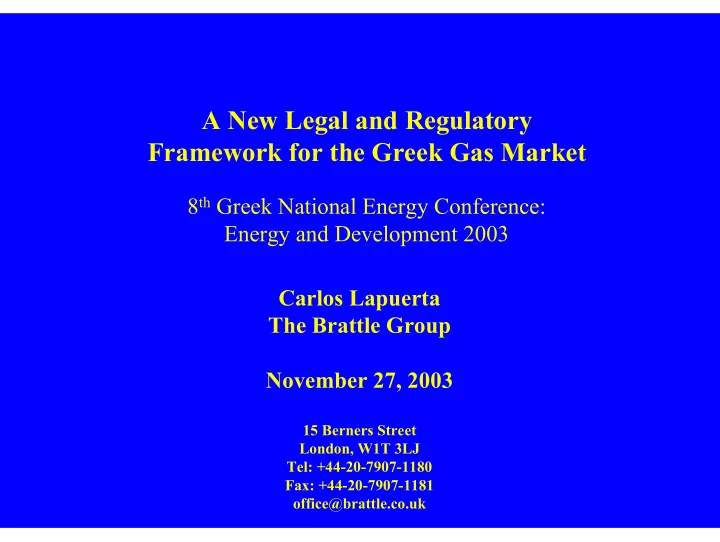

A New Legal and Regulatory Framework for the Greek Gas Market 8 th Greek National Energy Conference: Energy and Development 2003 Carlos Lapuerta The Brattle Group November 27, 2003 15 Berners Street London, W1T 3LJ Tel: +44-20-7907-1180 Fax: +44-20-7907-1181 office@brattle.co.uk
The Need for Detailed Rules and Regulations One day, Greek consumers will be eligible to pick suppliers. How do we prepare for that day? n You cannot just pass a law that says: “consumers: you are free” n This was the German approach: immediate 100% market opening. Nothing else. n Germany lacked a legal and regulatory framework that could permit the development of competition. n For years the German ministry argued that the Competition Authorities could compensate for the absence of detailed rules and regulations. n This approach has failed. 2 The Brattle Group
The Project RAE has hired a consortium of economists and legal experts to design a legal framework that could permit the development of effective competition. International Greek Economic The Brattle Group Exergia Legal Freshfields Bruckhaus Stelios Koussoulis Deringer & Associates The project has involved many aspects of policy in the gas sector, but this presentation focuses on the development of competition in gas supply. 3 The Brattle Group
DEPA’s Position in the Gas Market n For many years DEPA will have a strong position in the Greek gas market. n There is nothing wrong with this, as long as we can be sure that DEPA must compete effectively to retain its position. Two Strategies Prevent Abuse Reduce Entry Barriers While Dominant Rules for Access to Restrictions on the Transportation Behaviour System 4 The Brattle Group
Restrictions on Supply Practices Prevent Abuse While Dominant Market Regulation Share 100 % n Full Price Regulation 80 % n Dominant suppliers required to: a) charge same price formula within major customer categories, b) offer a standard, published and approved gas contract that gives customers flexibility. n Below certain market share, no regulation 40 % 5 The Brattle Group
Reducing Entry Barriers Prevent Abuse While Dominant Reduce Entry Barriers 1. Entry/Exit System 2. Balancing Rules 3. Making Capacity Available 4. Rules for Sharing Revythoussa 6 The Brattle Group
An Entry/Exit System n An entry/exit system does not mean different tariffs for different places on the transportation network. n We are talking about the flexibility of transportation contracts. Point-to-Point TSO says: Sorry, B need a new C A ? contract Exit Entry/Exit Entry • Separate contracts for “A” and “C” A C • If you lose customer, refund for “C” B D • “A” still useful 7 The Brattle Group
Balancing Rules n An imbalance means: amount of gas injected = gas withdrawn n There are two ways of viewing imbalances: A. Balancing is bad behaviour. People should pay penalties. The TSO should have the responsibilities of a policeman. B. Just pay for any costs caused by imbalances. n We reject the first view as inherently discriminatory . A. Large shippers naturally find it easier to stay in balance. Yet this is only an inherited advantage, not the result of superior management. B. DEPA should not care if it pays imbalance penalties: the money will just move from one subsidiary (supply) to another (transportation). But other shippers care a lot if they pay penalties. n Penalties are also inefficient, since they imply paying more than costs. Our proposals avoid any penalties, to permit efficient competition. 8 The Brattle Group
Making Capacity Available In most Member States, the following can still happen n Company “A” serves a customer gas. n Company “B” is willing to supply gas from the same source more cheaply. n The customer wants to switch. n The Transmission System Operator says “sorry, I have no transportation capacity available! Company A owns it.” n Company B complains: “you have sufficient transportation capacity. As soon as I serve the customer, you know that Company A will stop. We propose rules for the transportation network that would automatically allow Company B to serve the customer. 9 The Brattle Group
Sharing Revythoussa n Company A wants to supply X amount of gas per year through Revythoussa. n Company B wants to supply X/2. n Delivering X involves two vessels per month to Revythoussa. We propose: A’s vessel B’s vessel A’s vessel Jan. 30 Jan. 20 Jan. 10 n Every day, Company A could regassify something close to X/365, and Company B half this amount. The key is: B does not have to wait until Jan. 20 to start withdrawing gas . 10 The Brattle Group
Conclusions The obstacles to competition in other Member States provide n strong lessons for designing an appropriate legal framework. We are near completion of a proposed legal framework that n would: A. Allow new companies to use the transportation network in a flexible manner to compete effectively with DEPA B. Prevent DEPA from abusing any market power while dominant. C. Relax restrictions if the market becomes more competitive. If implemented, our proposed legal framework would be among the most advanced in Europe. 11 The Brattle Group
Recommend
More recommend